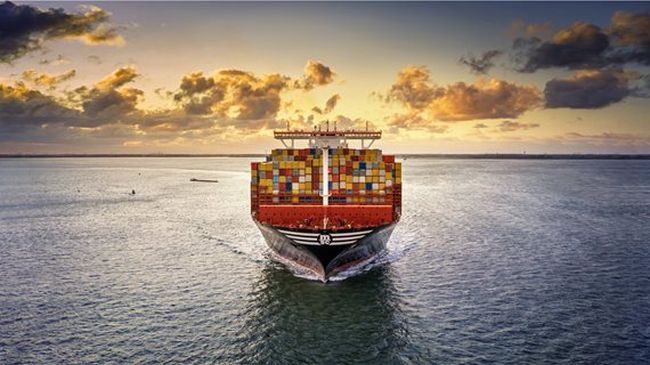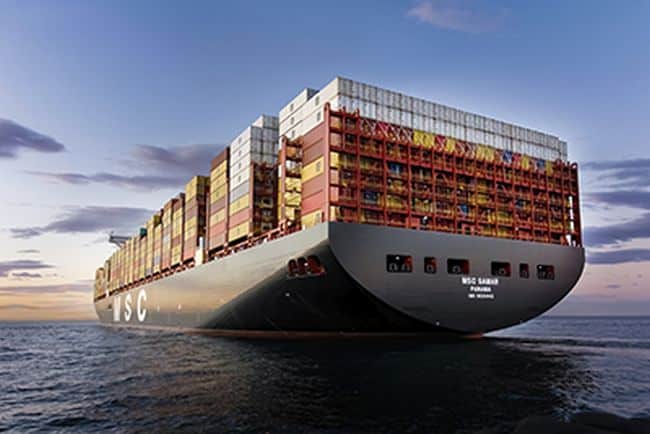MSC Continues To Invest In Low-Carbon Future: Operating Modern, Green Fleet
Improving the environmental performance of the container shipping supply chain is a common goal shared by shipping lines, shippers, freight forwarders and non-vessel operating common carriers, as well as governments, regulators, and the public around the world.
The UN International Maritime Organization (IMO) requires that from 1 January 2020, Sulphur content in the fuel used for international shipping must be limited globally to 0.5%, compared with the current standard of 3.5%, in order to minimize emissions of Sulphur oxides from ships.
MSC is committed to reducing the environmental footprint of global supply chains and keeps implementing concrete plans to modernise its green and efficient fleet via the largest container shipping investment program in the industry.

Image Credits: msc.com
Its fleet improvement program has resulted in a 13% reduction in CO2 emissions per transport work* in 2015-18. The company also completed a massive retrofit program in its existing fleet with the installation of Exhaust Gas Cleaning Systems (ECGS) to reduce emissions of sulphur oxides and other pollutants. In its compliance strategy, MSC will combine the use of ECGS, conventional low-sulphur fuel and biofuels.
Furthermore, the next generation of 23,000+ TEU newbuilds – led by MSC Gülsün, the largest container ship in the world – has introduced a new class of sustainable container shipping, with the lowest carbon footprint by design, at 7.49 grams of CO2 emissions to move 1 ton of cargo 1 nautical mile.
“MSC is on a well-defined pathway to meet the 2030 IMO level of ambition for CO2 emissions intensity reduction. The great challenge which remains for container shipping this century is how to decarbonise and meet the UN IMO’s future emissions goals beyond 2030. While we are fully supporting these more distant targets, this will not be achievable without some major breakthroughs in fuel and propulsion technologies,” said Bud Darr, Executive Vice President, Maritime Policy & Government Affairs, MSC Group.
While recent improvements have depended largely on better-performing engines, more efficient propeller and rudder designs and technologies to reduce hull friction, MSC is actively studying the potential of new alternative fuel sources. The company is engaging with potential vendors to investigate solutions related to biofuel blends, hydrogen fuel cells, complementary battery power and, possibly, wind and solar, as part of a long road of discovery in relation to future policy goals.

MSC Samar (built 2019), 23 756 TEU | Image Credits: msc.com
Improving the environmental performance of the container shipping supply chain is a common goal shared by shipping lines, shippers, freight forwarders and non-vessel operating common carriers, as well as governments, regulators, and the public around the world.
The UN International Maritime Organization (IMO) requires that from 1 January 2020, Sulphur content in the fuel used for international shipping must be limited globally to 0.5%, compared with the current standard of 3.5%, in order to minimize emissions of Sulphur oxides from ships.
MSC is committed to reducing the environmental footprint of global supply chains and keeps implementing concrete plans to modernise its green and efficient fleet via the largest container shipping investment program in the industry.
Its fleet improvement program has resulted in a 13% reduction in CO2 emissions per transport work* in 2015-18. The company also completed a massive retrofit program in its existing fleet with the installation of Exhaust Gas Cleaning Systems (ECGS) to reduce emissions of sulphur oxides and other pollutants. In its compliance strategy, MSC will combine the use of ECGS, conventional low-sulphur fuel and biofuels.
Furthermore, the next generation of 23,000+ TEU newbuilds – led by MSC Gülsün, the largest container ship in the world – has introduced a new class of sustainable container shipping, with the lowest carbon footprint by design, at 7.49 grams of CO2 emissions to move 1 ton of cargo 1 nautical mile.
“MSC is on a well-defined pathway to meet the 2030 IMO level of ambition for CO2 emissions intensity reduction. The great challenge which remains for container shipping this century is how to decarbonise and meet the UN IMO’s future emissions goals beyond 2030. While we are fully supporting these more distant targets, this will not be achievable without some major breakthroughs in fuel and propulsion technologies,” said Bud Darr, Executive Vice President, Maritime Policy & Government Affairs, MSC Group.
While recent improvements have depended largely on better-performing engines, more efficient propeller and rudder designs and technologies to reduce hull friction, MSC is actively studying the potential of new alternative fuel sources. The company is engaging with potential vendors to investigate solutions related to biofuel blends, hydrogen fuel cells, complementary battery power and, possibly, wind and solar, as part of a long road of discovery in relation to future policy goals.
Sustainability Report
The latest edition of MSC’s Sustainability Report details some of the company’s activities around preserving the environment, as well as social inclusion, health and safety and business ethics. To download a copy please go to msc.com/sustainability.
Reference: msc.com














